 James Hubert "Eubie" Blake (February 7, 1887 to February 12, 1983) | |||
 Ragtime/Jazz Compositions Ragtime/Jazz Compositions | |||
|
c.1903
Charleston Rag [Sounds of Africa]c.1907
Kitchen TomBrittwood Rag c.1910
The Baltimore TodoloPoor Jimmy Green Poor Katie Rad Novelty Rag c.1911
Tickle the Ivories [1]1914
Ragtime RagThe Chevy Chase Fizz Water Classic Rag c.1915
Baltimore Buzz1916
Bugle Call Rag [w/Carey Morgan]c.1919
Blue Rag in Twelve KeysBlack Keys on Parade 1921
Fare Thee Honey BluesIt's Right Here for You 1923
That Syncopated Charleston DanceRain Drops 1935
ButterflyTruckin' On Down 1936
Blue Thoughts1945
Boogie Woogie Beguine |
1949
Dicty's On Seventh Avenue1950
Capricious Harlem1958
Hot Feet1959
Tricky FingersRagtime Toreador [1] 1969
Eubie's Boogie1971
Troublesome IvoriesMelodic Rag [1] Novelty Rag [1] 1972
Eubie Dubie [w/Johnny Guarinieri]Eubie's Classical Rag Valse Marion 1973
Rhapsody in Ragtime1974
Randi's Rag1975
Betty Washboard's Rag [1]Unknown or Uncertain
Broadway in Dahomey [1]Joe Stern Rag [1] Merry Widow Rag [1] Raggin' the Rag [1] Ragtime Piano Tricks [1] Scarf Dance [1] Waltz Amelia [1]
1. Unpublished or Uncopyrighted
| ||
 Songs/Broadway Productions Songs/Broadway Productions | |||
|
1915
It's All Your Fault [2,3]1916
See America First [2,3]My Loving Baby [2] At the Pullman Porters [2] 1917
Mammy's Little Chocolate Cullud Chile [2]A Little Bit of Honey [2] 1918
To Hell with GermanyI've Got the Lovin'es' Love forYou [2,4] On Patrol in No Man's Land [2,4] Mirandy (That Gal o' Mine) [2,4] 1919
All of No Man's Land is Ours [2,4]Good Night Angeline [2,4] Jazz Baby [2,4] Baltimore Blues [2] Michi Mori San [2] Ain't-Cha Coming Back, Mary Ann, to Maryland [2] Affectionate Dan [2] Gee! I Wish I Had Someome to Rock Me (in the Cradle of Love) [2] You've Been a Good Little Mammy to Me [2] Gee! I'm Glad That I'm From Dixie [2] I'm Simply Full of Jazz [2] He's Always Hanging Around [2] 1920
Florodora GirlsOriental Blues [2] Broadway Blues [2] Pickaninny Shoes [2] 1921
Good Fellow BluesBoll Weevil Blues [2] Arkansas Blues (Down Home Chant) [2] High Steppin' Days Low Down Blues [2] Shuffle Along: Musical [2] Love Will Find a Way Bandana Days Sing Me to Sleep, Dear Mammy (In) Honeysuckle Time Gypsy Blues Shuffle Along (I'm Just) Wild about Harry Syncopation Stenos Baltimore Buzz (Song) If You've Never Been Vamped by a Brown- skin, You've Never Been Vamped at All Uncle Tom and Old Black Joe Everything Reminds Me of You I Am Craving for That Kind of Love Daddy (Won't You Please Come Home) African Dip 1922
Seranade Blues [2]You Were Meant for Me Boo Hoo Hoo [2] Lovin' Chile [2] 1923
Don't Love Me Blues [2]Elsie: Musical [2] A Regular Guy Two Hearts in Tune My Crinoline Girl I'd Like to Walk with a Pal Like You Baby Buntin' Sand Flowers Everybody's Struttin' Now Thunderstorm Jazz 1924
You Ought to Know [2]I Was Meant for You [2] There's a Million Little Cupids in the Sky [2] Dear Lil' Pal [2] The Chocolate Dandies: Musical [2] Have A Good Time, Everybody That Charleston Dance The Slave of Love |
1924 (Cont)
The Chocolate Dandies: (Cont) [2]I'll Find My Love in D-I-X-I-E Bandanaland The Sons of Old Black Joe Jassamine Lane Dumb Luck Jump Steady Breakin' 'Em Down A Jockey's Life for Mine Dixie Moon The Land of Dancing Pickaninnies Thinking of Me Manda (Fox Trot Blues) Take Down Dis Letter Chocolate Dandies 1925
Why Did You Make Me Care?I Wonder Where My Sweetie Can Be [2] That South Car'lina Jazz Dance [2] Broken Busted Blues [2] 1926
A Jockey's Life for Mine [2]Messin' Around [5] 1927
You're Calling Me Georgia [6]1930
Loving You the Way I Do [7,8]Lew Leslie's Blackbirds: Musical [5] My Handy Man Ain't Handy No More Baby Mine Cabin Door We're the Berries Mozambique Take a Trip to Harlem That Lindy Hop Green Pastures [7] Dianna Lee Memories of You You're Lucky to Me Roll, Jordan, Roll 1933
Sore Foot BluesDusting Around 1936
It Ain't Being Done No More [9]1936
Mr. Church Rock, Church, Rock [10]1937
Blues, Why Don't You Let Me Alone? [11]Ain't We Got Love Moods of Harlem 1940
Playing Bingo [10,12]We Are Americans Too 1941
I'd Give a Dollar for a Dime [5]1942
Sweet Magnolia Rose [5]1945
John Saw the Number [10]1960
Tweets Says [2,13]1968
Didn't the Angels Sing [2]19??
Jubilee Tonight [2,14]
2. w/Noble Sissle
3. w/Eddie Nelson 4. w/James Reese Europe 5. w/Andy Razaf 6. w/Bernie Grossman & Eddie Nelson 7. w/Will Morrisey 8. w/Jack Scholl 9. w/George Scherzer & Gene Irwn 10. w/J. Milton Reddie 11. w/Arthur Porter 12. w/E.P. Levy 13. w/Roslyn Stock 14. w/Perry Bradford | ||
 Selected Discography of 78s Selected Discography of 78s | |||
| |||
 Selected Discography of LPs Selected Discography of LPs | |||
| |||
Eubie Blake was one of the longest lasting pioneers of ragtime, and lived to nearly a week past his 96th birthday, although not his 100th as had long been believed. There is much in the way of legal demographic evidence to show that Blake was actually born in 1887, not 1883 as was commonly written throughout the second half of the 20th century. It has also been said he was born to former slaves John Sumner Blake and his wife Emily "Emma" Johnston. However, John was born in 1838 in Maryland, a free state, so his status as a former slave is unclear, and Emma was born in Virginia in 1861, so would have been freed by the time she was four. The couple was married around 1882 in Baltimore. Hubert was possibly the only child of eight that survived to adulthood, according to the 1900 and 1910 enumerations. This number is hard to confirm through Maryland records, so since it is word of mouth there may be some slight variance to that number.
Hubert showed a definite propensity for both performance and composition at a very young age. Around the age of six he is said to have wandered away during a shopping trip into an organ store and started working out melodies. 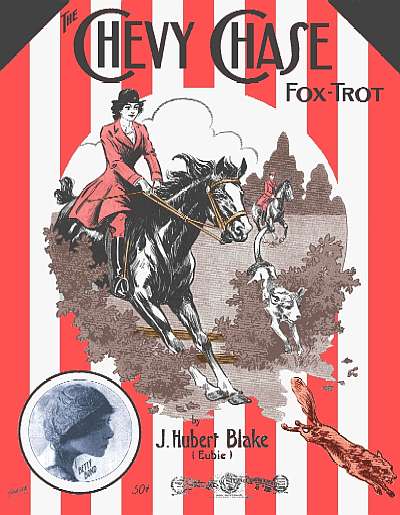 The store owner insisted that the boy had a natural talent, and his parents ended up obtaining a $75.00 foot-pumped reed organ, reportedly one a bit more expensive than they would have liked, paid out over an extended period.
The store owner insisted that the boy had a natural talent, and his parents ended up obtaining a $75.00 foot-pumped reed organ, reportedly one a bit more expensive than they would have liked, paid out over an extended period.
 The store owner insisted that the boy had a natural talent, and his parents ended up obtaining a $75.00 foot-pumped reed organ, reportedly one a bit more expensive than they would have liked, paid out over an extended period.
The store owner insisted that the boy had a natural talent, and his parents ended up obtaining a $75.00 foot-pumped reed organ, reportedly one a bit more expensive than they would have liked, paid out over an extended period.Hubert was soon able to play hymns and sacred tunes, but raised his mother's blood pressure when they came out syncopated from time to time. At age 12 he formed a quartet with three other friends and started earning change singing outside of bars and similar establishments. As of the 1900 census, Eubie and his parents were living at 1508 Jefferson Street in Baltimore, along with four lodgers, including two nieces and two nephews. John was shown as a day laborer and Eubie as in still in school. His birth date is clearly shown to be February 1887.
Eubie, as he would be known, composed his first known ragtime piece, Charleston Rag, when he was 16, which would make it 1903 rather than 1899 as commonly reported in error. While we may never know how it sounded in at least its earliest renditions as it was not recorded for another 14 years, the version that did survive from that time remains a challenge to this day for even the most adept pianists.
There is a plausible legend often told that when in his teens, Eubie was playing in Baltimore brothels, including that of Angie Shelton. A friend of his mother reportedly heard Eubie's distinct playing of Charleston Rag wafting out from the windows of one of this bordellos (what was she doing in that part of town anyway?). The incident was, of course, immediately reported, and when Eubie came home that evening/morning, his mother was waiting. "Whatchyu doin' playin' in one of them houses of ill repute?" she demanded. After a bit of stuttering and gathering himself, the younger Blake looked at his mother and said, "I'm gettin' near a hundred dollars a night, mama." After a moment of thought and decision, Mama replied, "Well, give me half and I won't tell your father!" In reality, his father evidently approved because Eubie was too young to spend the money, at least where he worked.
The commonly accepted timeline is again called into question, as Eubie supposedly started with "Dr. Frazier's Traveling Medicine Show" on "July 4, 1901." This was more likely 1904 or 1905, and the July 4 date is as much legend as is his erroneous birth year. 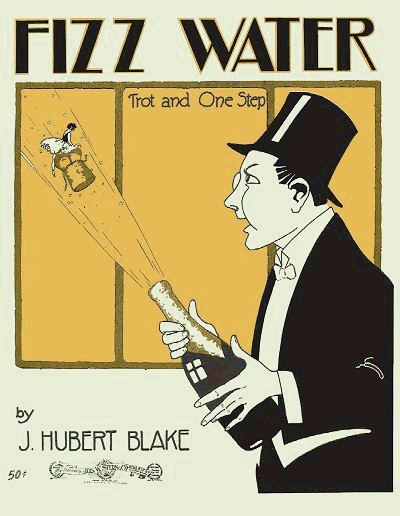 No mention of the show was made in any historical papers that were researched, but he likely was real as there were many such "entrepreneurs" at that time. Eubie played the melodeon, essentially a small pump organ, and did some buck and wing dances. Blake did study with professional teachers in his teens, and soon graduated from Baltimore to Atlantic City, probably around 1907, substituting for other pianists or playing pickup gigs during the summer.
No mention of the show was made in any historical papers that were researched, but he likely was real as there were many such "entrepreneurs" at that time. Eubie played the melodeon, essentially a small pump organ, and did some buck and wing dances. Blake did study with professional teachers in his teens, and soon graduated from Baltimore to Atlantic City, probably around 1907, substituting for other pianists or playing pickup gigs during the summer.
 No mention of the show was made in any historical papers that were researched, but he likely was real as there were many such "entrepreneurs" at that time. Eubie played the melodeon, essentially a small pump organ, and did some buck and wing dances. Blake did study with professional teachers in his teens, and soon graduated from Baltimore to Atlantic City, probably around 1907, substituting for other pianists or playing pickup gigs during the summer.
No mention of the show was made in any historical papers that were researched, but he likely was real as there were many such "entrepreneurs" at that time. Eubie played the melodeon, essentially a small pump organ, and did some buck and wing dances. Blake did study with professional teachers in his teens, and soon graduated from Baltimore to Atlantic City, probably around 1907, substituting for other pianists or playing pickup gigs during the summer.It was there at some point between 1908 and 1910 that he became acquainted with two Harlem pianists who were also starting their career, Willie "The Lion" Smith and Charles Luckeyth "Luckey" Roberts. Eubie both influenced and learned from the pair, and Roberts became a life-long friend. Both men had comparable styles and hand spans, and Roberts would be the first of the Harlem pianists to have his works published, followed shortly by the recently transplanted Baltimore native. Eubie soon spent more time in New York City. It was there that he met up again with classical pianist Avis C. Lee, who he had known a decade earlier while attending primary school, and proposed marriage to her. Some sources claim this was in July of 1910. However, the couple was shown living as married in Atlantic City during the 1910 enumeration taken on April 16. Eubie was listed as 24 instead of 23, but this was only a slight exaggeration. They had been married that very week, although curiously enough, for the enumeration taken in Baltimore on April 18th, his parents listed their son as single and living in their household at age 23, and working as a hotel musician. The elder Blakes also had a nephew, niece and adopted daughter residing with them.
Eubie wrote a number of rags that made it to publication during the 1910's as his reputation grew. However, they unfortunately had to be simplified from his unique playing style for the sake of public consumption. His earliest rags were published by Joseph Stern who had also published some of Roberts' pieces. Many of Blake's rhythms and "Eubieisms" were just too complex to notate, much less to play. Included in these are The Chevy Chase, named after an equestrian country club just north of the District of Columbia line in suburban Maryland, where Blake or some of his peers had probably performed at some point. Another title, Fizz Water, showed adaptability as it was written as a one-step but also made for a good two-step or rag with a little alteration. The span of Blake's hands easily reached a twelfth, or a full octave and a half on the keyboard. So the left hand patterns were often condensed in print for easier playing by the average pianist. Fortunately for history, he cut many piano rolls of his material during this period, as well as later in life.
During this period in New York City, Eubie made a name for himself both as a pianist and an occasional musical director. 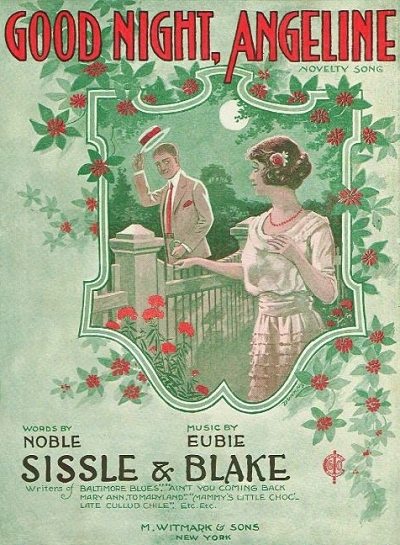 He also knew and worked with many members of the much vaunted Clef Club, such as founder James Reese Europe and composer Will Marion Cook. Being the most disciplined musicians in the city, white or black, all of them saw work performing for the "400", the cream of white society, which helped refine their musical skills and personalities even further.
He also knew and worked with many members of the much vaunted Clef Club, such as founder James Reese Europe and composer Will Marion Cook. Being the most disciplined musicians in the city, white or black, all of them saw work performing for the "400", the cream of white society, which helped refine their musical skills and personalities even further.
 He also knew and worked with many members of the much vaunted Clef Club, such as founder James Reese Europe and composer Will Marion Cook. Being the most disciplined musicians in the city, white or black, all of them saw work performing for the "400", the cream of white society, which helped refine their musical skills and personalities even further.
He also knew and worked with many members of the much vaunted Clef Club, such as founder James Reese Europe and composer Will Marion Cook. Being the most disciplined musicians in the city, white or black, all of them saw work performing for the "400", the cream of white society, which helped refine their musical skills and personalities even further.In 1915, Eubie met lyricist Noble Lee Sissle, and they started a long run as a composing duo. That run was interrupted in 1917 as Sissle was called to serve with the Army in Europe with Smith (who possibly earned his "Lion" nickname there), Jim Europe, and other black New York musicians. Eubie was likely passed over for service as was Roberts due to their diminutive height. His June 1917 draft card shows him working as a musician for the "Cleff Club" [sic] under Europe, and supporting his mother and wife. When Sissle returned after the war, both he and Blake were a part of Europe's band for a short time before he was killed in a scuffle with the band's drummer.
Shortly after Europe's untimely death, Sissle and Blake teamed up as a piano and vocal act, and burned up the stage in the last years of vaudeville, hitting the boards as The Dixie Duo on the Keith Theater Circuit. They played many of the best houses while on tour, and at home, including the storied Palace in New York City. According to New York Clipper of September 10, 1919, Sissle and Blake were not only the big hits of the bill at the Royal Theatre, but they held up the show at every performance, probably for encores and applause. The partners also had a relatively large quantity of new songs released in 1919 and 1920, of which Good Night Angeline was one of their most popular. Some of their songs were picked up by other artists as well on records and piano rolls. Their post-war works were enough to secure them a contract with the Witmark publishing house, a notable achievement for "colored" performers at that time.
However, they both wanted something more, not just for them but for the black musical community in general. Eubie had by now distinguished himself as one of the prestige artists making rolls for Rythmodik and Ampico, and was frequently advertised under the heading of "temperamental artists whose playing makes little masterpieces of the lighter music." But there were greater things around the corner as the 1920s started. As of the January 1920 census, Eubie, shown as James Blake, and Avis were living in Harlem at 236 West 138th Street. He was listed as a vaudeville actor aged 33 and Avis with no profession.
While Sissle was in Europe in 1917, Eubie made his first recordings on piano rolls and records, the latter on the Pathé label as The Eubie Blake Trio. Eubie finally committed his Charleston Rag, or Sounds of Africa, to piano roll, but also recorded a number of rags, early blues and even some spirituals for the QRS roll company. Now riding a wave of popularity in 1921, Eubie and Noble and an ensemble made a series of recordings on the Emerson label under the name of Noble Sissle and his Sizzling Syncopators.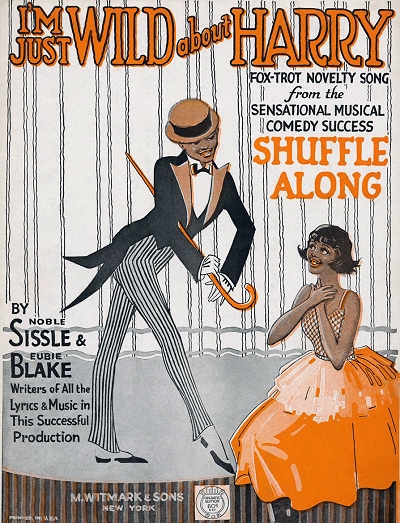 Some of the Sissle recordings were curiously released under the name of Len Graham. They also recorded several piano and vocal duo tracks over the next few years on the Edison Bell, OKeh, Victor, Emerson, Paramount and Pathé labels. In many cases, their energetic tracks were not relegated to the status of "race records" which was common in the 1920s. Eubie and his orchestra also served as an accompanist to blues singer Alberta Hunter, and he played two of the sides with her as a solo pianist.
Some of the Sissle recordings were curiously released under the name of Len Graham. They also recorded several piano and vocal duo tracks over the next few years on the Edison Bell, OKeh, Victor, Emerson, Paramount and Pathé labels. In many cases, their energetic tracks were not relegated to the status of "race records" which was common in the 1920s. Eubie and his orchestra also served as an accompanist to blues singer Alberta Hunter, and he played two of the sides with her as a solo pianist.
 Some of the Sissle recordings were curiously released under the name of Len Graham. They also recorded several piano and vocal duo tracks over the next few years on the Edison Bell, OKeh, Victor, Emerson, Paramount and Pathé labels. In many cases, their energetic tracks were not relegated to the status of "race records" which was common in the 1920s. Eubie and his orchestra also served as an accompanist to blues singer Alberta Hunter, and he played two of the sides with her as a solo pianist.
Some of the Sissle recordings were curiously released under the name of Len Graham. They also recorded several piano and vocal duo tracks over the next few years on the Edison Bell, OKeh, Victor, Emerson, Paramount and Pathé labels. In many cases, their energetic tracks were not relegated to the status of "race records" which was common in the 1920s. Eubie and his orchestra also served as an accompanist to blues singer Alberta Hunter, and he played two of the sides with her as a solo pianist.Sissle and Blake were among the first black songwriters to be produced on Broadway. Their earliest and best known show, which has seen revivals into the 21st century, is Shuffle Along, which was produced in collaboration with the comedy team of Flournoy E. Miller and Aubrey Lyles, and based on their own play, The Mayor of Jimtown. The musical got good notices from the very beginning. The Music Trade Review of June 4, 1921, offered the following:
A new musical show called 'Shuffle Along,' produced and played by a company of clever colored performers, evidently marks the return of the days of Williams and Walker, with some added improvements of a modern character, which make it, if anything, more entertaining. It has really good music and much dancing, with many new and clever novel effects. Most of the credit for the success of this new piece goes to two versatile negroes, Noble Sissle and Eubie Blake, who have supplied all the music and lyrics and who both play important parts in the cast, Blake doing some clever work at the piano and Sissle impersonating with zest a political character. Sissle and Blake are in vaudeville and are not unknown in the talking machine record- field.
The cast offered some of the best black performers of that time, including the saucy Josephine Baker and the dynamic Florence Mills. Most importantly, it introduced black jazz into polite society. Shuffle Along ran a very respectable 504 performances in its first run between two theaters. Among their best known songs from these shows was I'm Just Wild About Harry, which he played regularly for most of his life. It was also used to great effect by Harry Truman for both his senatorial and presidential runs in 1940 and 1948 respectively.
Some of their success was repeated in 1923 with their latest musical Elsie. Their Boston run of the show was noted in The Music Trade Review of March 3, 1923: "Sissle and Blake Musical Comedy... Repeats Chicago Success - The musical comedy, 'Elsie,' which has had a successful run in Chicago and elsewhere, has made its appearance in Boston, where it is again recognized as a meritorious attraction.
Much of the music for this show was furnished by Noble Sissle and Eubie Blake, who were responsible for last season's success, 'Shuffle Along.' " In spite of the success on the road, the play ran for only 40 performances when it reached Broadway in April.
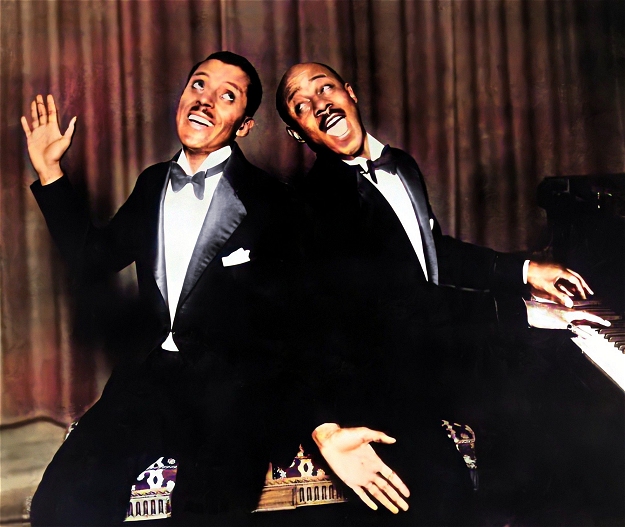 |
Sissle and Blake's efforts on the stage made it possible for many other black artists to have their works heard and produced. The duo also appeared in two of Lee De Forest's early experimental optical sound-on-film shorts in 1923, and Eubie in a third one, a solo effort playing his Fantasy on Swanee River. Blake later recalled that it was a difficult thing for Sissle to remain still in front of the camera since he liked to move, and believes that they were the first black act ever on sound film, giving credence to how influential they were on Broadway.
Blake was also known to some degree, according to later reports from those who traveled with him, as quite the ladies' man and a quiet philanderer. This, however, may have been in later years after Avis passed on, so is difficult to confirm from the word of mouth reports. Shuffle Along was followed by Elsie, which made it through only 40 performances. Another show in the fall of 1924, Chocolate Dandies, also did not fare so well, perhaps because it bucked stereotypes and presented blacks in more of a white context in terms of humor and romance. It closed after 96 performances before heading out on tour.
During a Toronto, Ontario, Canada, stop of the Chocolate Dandies tour, the boys got involved in a bit of a legal situation. After the 100th performance of the show Dream Girl, also on tour, they were invited to attend as the entertainment at a lavish party thrown by its white star, Fay Bainter, in her Toronto hotel suite. The celebration was said to have lasted until nearly daylight, and things got a bit out of hand. An inebriated cast member, Carl Lynn, fell down a flight of stairs and died nearly instantly. Bainter got into more than a bit of trouble as Sissle had brought along a quantity of liquor, therefore contributing to the death.
Although Canadian law at the time did not directly reflect the national prohibition of the United States, they did have their own Temperance Act established in 1878, and passed in Ontario in 1916, which allowed them to exercise certain restrictions. Sissle had violated those restrictions, and although both Eubie and Noble were arrested, the charges were withdrawn against the pianist, and the singer ended up paying a $50 [Can] fine.
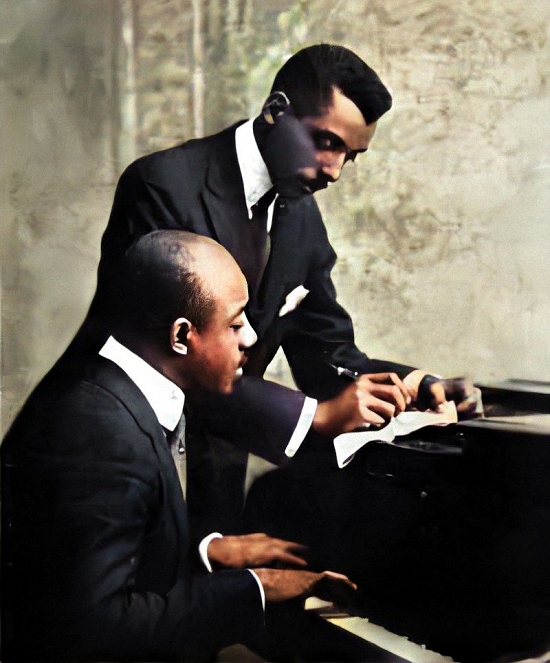 |
By 1926, the two were veterans, and attempted to enlighten Europe as to their musical styles. Eubie and Noble went the England where they met with a great deal of critical acclaim and stage success. However, the subsequent trip through parts of Europe was hard for Eubie, who was glad to be back in New York in short order. According to a newspaper interview of Eubie quoted in Sincerely Eubie by Terry Waldo, he said, "In Europe, a man or woman is either rich or poor. Poor boys don't grow to be rich men over there, there's no chance. The class system consigns one to the estate in which he was born until death. There is a caste system as strong as there is in India." While many black members of military admired their European counterparts for not having to deal with racism based on skin color, Eubie made it clear that birthright was an entirely different issue, and was glad to live in a society where in spite of the odds the earnest could succeed. In mid-1927 after one last joint recording session, Sissle decided to return to Europe and the team split up, although they would reunite briefly in 1958 with other Broadway friends to create a recording of their songs and for a couple of subsequent events.
Starting in late 1926 Eubie teamed up with lyricist Andy Razaf for several years. In 1927 and 1928 he took to the stage again, this time with a vaudevillian he had known years before who went by the name "Broadway" Jones. But with vaudeville being forced off the stage by sound films, their run did not last very long. Blake again worked with Razaf and the pair turned out a number of hits including the poignantly beautiful Memories of You and other tunes incorporated into Lew Leslie's Blackbirds of 1930. This early Great Depression show was touted as "Glorifying the Negro" and included music by Spencer Williams and Clarence Williams.
By this time, Razaf had also become one of Fats Waller's most frequent lyricist partners, but he was widely employed in the 1930s and 1940s by many composers and continued to write with Eubie as well. Blake revered him because he could supposedly write in meter almost as fast as Eubie could play the melody line. Eubie also wrote some songs with lyricist Henry Creamer and Joshua Milton Reddie, mostly for pickup shows.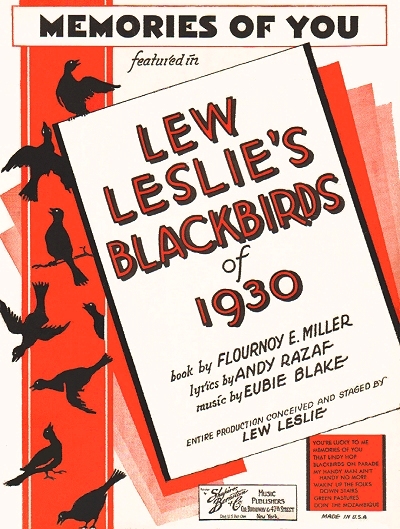 Published versions of these have not been located, and Creamer's death in 1930 cut short any future possibilities of their continued collaboration. Eubie also attempted a revamped version of Shuffle Along during the 1932 holiday season, but it ran for barely two weeks. One of the pianists for that short run was future star Nat "King" Cole. In the 1930 census, Eubie (shown as "Herbert") and Avis were still living in the same Harlem apartment on West 138th Street, and he was listed as a theater actor, this time his age curiously deflated to 41, indicating an 1889 birth.
Published versions of these have not been located, and Creamer's death in 1930 cut short any future possibilities of their continued collaboration. Eubie also attempted a revamped version of Shuffle Along during the 1932 holiday season, but it ran for barely two weeks. One of the pianists for that short run was future star Nat "King" Cole. In the 1930 census, Eubie (shown as "Herbert") and Avis were still living in the same Harlem apartment on West 138th Street, and he was listed as a theater actor, this time his age curiously deflated to 41, indicating an 1889 birth.
 Published versions of these have not been located, and Creamer's death in 1930 cut short any future possibilities of their continued collaboration. Eubie also attempted a revamped version of Shuffle Along during the 1932 holiday season, but it ran for barely two weeks. One of the pianists for that short run was future star Nat "King" Cole. In the 1930 census, Eubie (shown as "Herbert") and Avis were still living in the same Harlem apartment on West 138th Street, and he was listed as a theater actor, this time his age curiously deflated to 41, indicating an 1889 birth.
Published versions of these have not been located, and Creamer's death in 1930 cut short any future possibilities of their continued collaboration. Eubie also attempted a revamped version of Shuffle Along during the 1932 holiday season, but it ran for barely two weeks. One of the pianists for that short run was future star Nat "King" Cole. In the 1930 census, Eubie (shown as "Herbert") and Avis were still living in the same Harlem apartment on West 138th Street, and he was listed as a theater actor, this time his age curiously deflated to 41, indicating an 1889 birth.After kicking around for so long, Eubie seems to have largely dropped out of sight in the mid to late 1930s. In 1938 he lost his beloved wife Avis to tuberculosis. Her death sent him into a period of listless depression for at least a couple of years. In the 1940 census he is listed as widowed, with his occupation simply as music composer. But Eubie finally came out again during the Second World War. The first glimpse of him is that same census where he gives his age, in April, as 56, implying an 1884 birth year. Then on his draft record Blake clearly inflated his age by even another year. Why? The author and other writers thought it was perhaps to be of less use to the military in a combat mode (although his diminutive height and age should have precluded that), or perhaps some other unknown personal reason. In any case, the 1883 story stuck with him throughout the rest of his life.
During the war Eubie briefly reteamed with Sissle and they toured with the USO extensively for the duration, performing in the US and in the various war theaters in Western Europe. After the end of the war he married again, this time to Marion Gant Tyler. They moved into a brownstone in Brooklyn, and Eubie supposedly retired from music, again. In fact, the 1950 enumeration showed Eubie and Marion living on Stuyvesant Avenue in Brooklyn, hosting his in-laws, Francis Jones (stepfather) and Nettie Jones, but with no occupation listed. Yet he kept resurfacing one way or another right up until his death as his interest in music and performing never really waned.
Around 1949 or 1950, Blake started taking some formal classes in harmony and the Joseph Schillinger compositional method at New York University. He experimented with a number of formats incorporated into ragtime. The system was based on numbers rather than traditional harmonies, and Eubie went along with the advanced concept, creating works using math theory.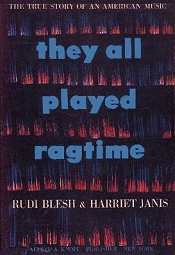 Among the most unique are the harmonically challenging Dicty's on Seventh Avenue, which was written as an assignment for the course as early as 1949, and the engaging Rhapsody in Ragtime. Eubie Blake had finally obtained his degree in music, and it was not just honorary; it was earned.
Among the most unique are the harmonically challenging Dicty's on Seventh Avenue, which was written as an assignment for the course as early as 1949, and the engaging Rhapsody in Ragtime. Eubie Blake had finally obtained his degree in music, and it was not just honorary; it was earned.
 Among the most unique are the harmonically challenging Dicty's on Seventh Avenue, which was written as an assignment for the course as early as 1949, and the engaging Rhapsody in Ragtime. Eubie Blake had finally obtained his degree in music, and it was not just honorary; it was earned.
Among the most unique are the harmonically challenging Dicty's on Seventh Avenue, which was written as an assignment for the course as early as 1949, and the engaging Rhapsody in Ragtime. Eubie Blake had finally obtained his degree in music, and it was not just honorary; it was earned.There was another brief revival of Shuffle Along in 1952. Then Eubie "retired" again, just as his fame was starting to spread through a recently published (1950) book called They All Played Ragtime. Now approaching his 70th year, Eubie saw a world where many of the innovative music styles being championed by other black performers, including be-bop, free form jazz and straight ahead jazz, were being overshadowed by a national nostalgic phase under the guise of Honky-Tonk Piano. Slowly, he was becoming a commodity again, largely as one of the few remaining pioneers of authentic ragtime performance and composition. Because of this, the bulk of Eubie's recordings were made from the 1950's through the 1970's.
Among the more notable recordings include a session arranged by ragtime performer Bob Darch in 1962. Darch had Blake and a couple of friends from his early days, Charley Thompson and Joe Jordan, brought to Florida where they reminisced and played for a recording that was released both as a radio show and, edited down, a record album called Golden Reunion in Ragtime on the Stereoddities label. This may have jump started his new desire to make records, but still remains an important recording. Ragtime artist Max Morath also helped bring attention to Eubie and other veterans on his television appearances in the early to mid-1960s.
In 1965, Sissle and Blake were honored on their fiftieth anniversary by both ASCAP and the American Guild of Vaudeville Artists. Two years later, Eubie was honored with a bust by sculptress Estelle V. Wright at the Museum of the City of New York. In 1968 he was reunited again with Sissle for the mislabeled album The 86 Years of Eubie Blake (should have read as 82) which was produced by veteran John Hammond who had been responsible for the success of artists such as Benny Goodman and Billie Holiday decades before. The old team also composed a tribute to slain civil rights leader Martin Luther King at the same time. He also went back into the business of not only composing but cutting piano rolls as well in the early 1970s.
Blake also mentored many young artists. One of those was ragtime historian and performer Terry Waldo, who wrote out many important transcriptions of Eubie's pieces in the early 1970's, and assembled the Sincerely Eubie folio. Waldo not only preserved some of the older Eubie pieces that had not been available before,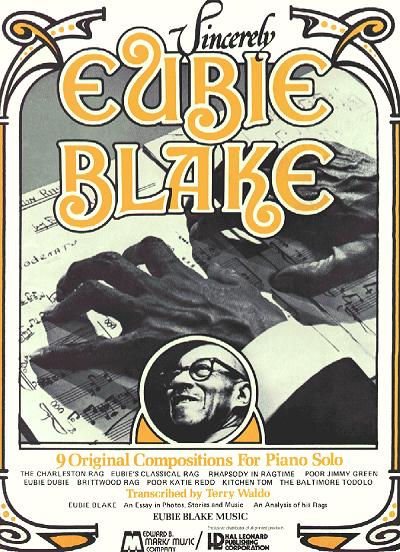 but also made newer works, such as Rhapsody in Ragtime, more accessible to pianists of moderate and better skills. Blake even got his own record label, Eubie Blake Music, for a few years. Among the artists who appeared with him on the limited run discs was Jim Hession, who has had a successful career in ragtime and jazz, and with the Disney organization. Hession now lives in New Orleans, but has vivid memories about his time working and traveling with Eubie.
but also made newer works, such as Rhapsody in Ragtime, more accessible to pianists of moderate and better skills. Blake even got his own record label, Eubie Blake Music, for a few years. Among the artists who appeared with him on the limited run discs was Jim Hession, who has had a successful career in ragtime and jazz, and with the Disney organization. Hession now lives in New Orleans, but has vivid memories about his time working and traveling with Eubie.
 but also made newer works, such as Rhapsody in Ragtime, more accessible to pianists of moderate and better skills. Blake even got his own record label, Eubie Blake Music, for a few years. Among the artists who appeared with him on the limited run discs was Jim Hession, who has had a successful career in ragtime and jazz, and with the Disney organization. Hession now lives in New Orleans, but has vivid memories about his time working and traveling with Eubie.
but also made newer works, such as Rhapsody in Ragtime, more accessible to pianists of moderate and better skills. Blake even got his own record label, Eubie Blake Music, for a few years. Among the artists who appeared with him on the limited run discs was Jim Hession, who has had a successful career in ragtime and jazz, and with the Disney organization. Hession now lives in New Orleans, but has vivid memories about his time working and traveling with Eubie.Surprisingly, the elderly Eubie Blake even made appearances on the Tonight Show with Johnny Carson, The Today Show, What's My Line, the Saturday morning young adults show Wonderama, The Mike Douglas Show, and radio appearances with Morath and historian/orchestra leader Gunther Schuller. His native city, Baltimore, Maryland, honored him with Eubie Blake Day as well. There were also celebrations for Eubie in Switzerland, Denmark, Norway, Canada, and at the Newport and New York Jazz Festivals.
Many of these celebrations occurred in 1973, which was allegedly his 90th year, and even though Blake was rightly honored for all his achievements, he never let on publicly about his actual age at that time. It is still a mystery as to why the birth date was inaccurately reported for so long, and it seems to bear some significance to those who wanted Eubie to live to be 100. In all fairness, there was another James H. Blake Jr. born in Easton, Maryland not too far from Baltimore, in 1883, as census records from 1900 forward would indicate. He was not ever shown to be in the music business, listed instead as a laborer. However, this does not explain the Eubie deception. As previously detailed, the 1900 census shows him as 13; the 1910 enumeration taken in Atlantic City, New Jersey stated his age as 24 (just a little off); his parents reported him two days later as 23; his World War I draft card very clearly indicated February 7, 1887 as a birth date as did a 1920 passport application, complete with a signed affidavit from his mother; the January 1920 census has the more accurate age of 33 (shy by three weeks); his marriage certificate also indicated 1887 as birth year; and the 1930 census listed him as 41, implying an 1889 birth year - younger instead of older. Surprisingly, even his 1983 death record signed by a New York City coroner and Social Security records show the 1887 birth date, and yet surprisingly it took nearly 20 years for this information to become public knowledge, even to ragtime scholars.
When did the deception begin? This is hard to pinpoint. However, the 1940 census implied an 1884 year of birth, and his 1942 draft registration card lists him as being born in 1883 and therefore 59 at that point, just a little old for induction and to be of much use. The government did not have computerized records back then, or this inconsistency would have been quickly caught. That he lied knowingly to the Army is surprising, but we may never know his true motivation. Friends later noted that Eubie was clearly aware of the little lie,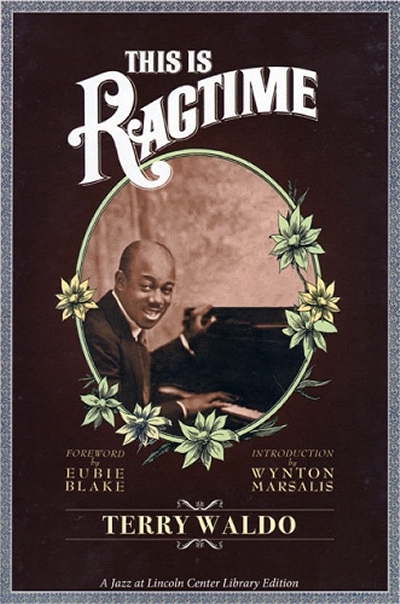 but that no malice was meant by it. Note that most of the knowledge we originally had of Eubie concerning age, et. al, was from word of mouth and interviews done from the time of They All Played Ragtime (1950) forward. So given that earlier buried records were essentially not well researched in lieu of Mr. Blake's integrity is understandable to a degree.
but that no malice was meant by it. Note that most of the knowledge we originally had of Eubie concerning age, et. al, was from word of mouth and interviews done from the time of They All Played Ragtime (1950) forward. So given that earlier buried records were essentially not well researched in lieu of Mr. Blake's integrity is understandable to a degree.
 but that no malice was meant by it. Note that most of the knowledge we originally had of Eubie concerning age, et. al, was from word of mouth and interviews done from the time of They All Played Ragtime (1950) forward. So given that earlier buried records were essentially not well researched in lieu of Mr. Blake's integrity is understandable to a degree.
but that no malice was meant by it. Note that most of the knowledge we originally had of Eubie concerning age, et. al, was from word of mouth and interviews done from the time of They All Played Ragtime (1950) forward. So given that earlier buried records were essentially not well researched in lieu of Mr. Blake's integrity is understandable to a degree. In his final years Eubie continued to pop up everywhere. There was a special race named after him at Pimlico on May 15, 1975, The Eubie Blake Purse. He had a guest spot in the 1977 ABC television movie Scott Joplin as the cutting contest judge. In September 1978, the celebratory Broadway musical Eubie opened to great acclaim and ran for more than a year at 439 performances. It yielded Blake and some of his former lyricists a Tony Award® for best original score. Eubie was the guest musical artist on Saturday Night Live on March 10, 1979 at the age of 92, appearing in an extended segment with the singing and dancing star of Eubie, Gregory Hines, who had also won a Tony Award® for his efforts.
Terry Waldo relayed a story to the author and a small group about his appearance. Evidently, Eubie, now 92, was spending more time either sleeping or dozing, or simply out of it during the day. When he came to life he was "all there," but much of the time he was closer to being in stasis. Hines and a couple of others really pushed for this appearance on SNL both to honor Blake and to promote the stage show. During the 8:30 rehearsal, Eubie, who was brought to the set in a wheelchair, was barely coherent, and did not perform up to expectations. Producer Lorne Michael was a bit put off by this and wanted to cancel the appearance altogether. Hines thankfully intervened and managed to convince Lorne that Blake would be on the ball when the time came, and he reluctantly agreed. Then, around 12:25, when Blake was called to the stage, he came to life, bounded (in a sense) out of his wheelchair, and got to the piano in time for his cue. He started to talk to Hines, and then suddenly asked, perhaps having come out of his daze, "Do you know who I am?" "Sure I do," replied Hines, perhaps hoping that Eubie also knew. Then the veteran performers launched into Low Down Blues, I'm Simply Full of Jazz, and I'm Just Wild About Harry in waltz time and ragtime, a memorable moment in both Eubie's life and the history of the still-new show.
Eubie Blake's career had spanned the time from primitive shows out of the back of a wagon to multi-media presentations on television, and from the days of audio on wax cylinders to the cusp of the time of digital multi-track recordings. He performed right into his 95th year, but was not able to make it to his premature 100th birthday celebration in 1983 held at New York's Lincoln Center. However, a ceremony held prior to that may have been the death of him, according to Terry Waldo. The Kennedy Center in Washington DC planned a special "100th" birthday celebration. Largely headed and arranged by stellar pianist Richard Roven "Dick" Hyman, it was held at the Washington venue in mid-December of 1982, videotaped for a later broadcast the following February. Included in the show were performers such as Rosemary Clooney, Cab Calloway, Joe Williams, Billy Taylor and Gregory Hines. Although he had been advised not to make the trip during a particularly cold period, Blake attended Eubie Blake - A Century of Music anyhow, and felt greatly honored. However, according to Waldo, he contracted pneumonia while he was on his travel, and it took hold of him over the next six weeks. Ultimately, it is possible that being honored in this way led to his death.
What is worse is that Waldo made it clear that following the show, almost nobody paid attention to or checked in on the ailing composer as he went downhill. Finally, just five days after his 96th birthday, he called on his friend Keith Dunham and asked him to come and "take him over." This was an old tradition of his race where somebody on this side would be there to hold his hand and help in his transition to the afterlife. Dunham did as Eubie asked, and as the composer slipped away asked him what he was seeing. Eubie said he saw the light and the people waiting for him on the other side, and that he was ready to cross over. Then he passed on while Dunham still held his hand, having left many lifetimes of memories and a substantial imprint on all who had encountered him. His remains were cremated and he was interred at Green-Wood cemetery in Brooklyn. Fortunately for us, unlike with many other ragtime era figures who were his contemporaries, we have a lot of documentation that he left behind giving us a unique glimpse into a magical time in American music.
This author/artist had his own personal experience with Eubie. It was in 1971 when a classic movie/stage theatre in Santa Monica, California, in celebration of a recent refurbishment, presented a restored version of Lon Chaney's 1925 classic Phantom of the Opera. It included many hand-tinted scenes along with the famous masquerade two-color Technicolor segment. They even transcribed some of the music of Don Juan Triumphant seen on the Phantom's organ to play back during the screening on the theatre's magnificent organ. Afterwards, the incomparable Eubie Blake performed about a half hour show on the piano. At first I thought it was just an old short guy that was going to do a couple of old songs (I was already taller than he was). Everybody was delighted at what came forth from his diminutive frame. It was then I was presented with the remarkable opportunity to meet the artist. I was nervous enough about this, being the fledgling twelve-year-old ragtime pianist that I was. But I remember drawing back a bit when the inordinately long and spindly fingers on his spidery hand came towards me. What an awesome experience this was, and a memory that will always stay with me.
Much of the biographical research on Eubie Blake, as well as restoration of his musical legacy, is through the efforts of Terry Waldo who transcribed and assembled the famed Sincerely Eubie folio. His book This is Ragtime has been re-released in 2009 with updated information, some about Eubie Blake. Some of it also comes from personal conversations with Waldo, one of the richest sources of Eubie lore, who likely has even more stories than can be relayed here in this format, including some perhaps not quite fit to print! The revelation of the birth date issue is in part due to the extraordinary efforts of the late Mike Meddings of the United Kingdom, who was a well known Jelly Roll Morton researcher, with help from California ragtime research Bob Pinsker. Additional demographics on his age and some other previously unknown facets of Blake's life included here were researched by the author from public records, periodicals and archived sources.